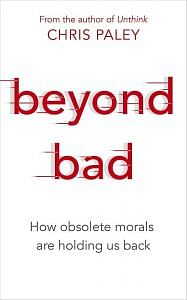Why don’t you go on that killing spree you’ve been dreaming about? Why pay for your new computer when you could take it? Why not sleep with your boss’s obviously bored, but rather attractive, partner?
It seems there’s a fly in our ointment. We live among people who have moral beliefs and act upon them, and we’ll see in this chapter that not only do they punish people who fail to conform, many of them enjoy doing so.
How come? In this chapter, we’ll see that humans created, among themselves, a unique evolutionary niche. In this niche, genes that caused our ancestors to be perceived as good spread faster than genes that didn’t.
Genes don’t have minds
Genes and morals have different PR advisers. Genes are weaselly little creatures, selfishly doing what they need to do to make more copies in the future. Theirs is the law of the jungle or of the large corporation: do what works and to hell with everything else.
Morals, on the other hand, are glorious, selfless, beneficent, civilised, good. They are the very opposite of genes. For them, helping others rates above helping the self, and making the world
a better place above being more prevalent in the world.
It’s perhaps possible, we might imagine, for morals to run counter to genetic interest because we see no reason to believe that morals are genetically determined. Support for slavery didn’t diminish because some new mutation spread rapidly. Take twins and put them in different societies and they’ll hold different principles, fight for different causes, worship different gods and act accordingly. Ethical systems vary too much across the world and change too fast to be determined by the design information in our nuclei.
Ethics, it seems, are cultural. We’ll see in more detail later how beliefs spread through word of mouth and seeing how others behave. We’ll find that we do what others do and come to believe that what we do is right.
However, this isn’t the whole story. I can only reason morally because my genes enable me to do so. I only pick up the ethics of my culture because those devilish little strands of twisted nucleic acids make me do so. My mind is there because of my genes.
Humans have morals, talk about morals and act morally because genes for doing these things have done better in the past than genes for not doing these things.
Also read: To end the coronavirus pandemic, we need a gene surveillance system
This statement is mind-bogglingly counterintuitive. It’s important to understand how this works: morals lead us to help other people who aren’t related to us at an apparent cost to ourselves, so why would genes that make us do such a thing be successful? On the face of it, this looks unlikely. Every human that we aid is a competitor fighting for the things that would help us to pass on our DNA.
There’s no greater conflict of interest than that between two animals of the same kind. Sure, the fox and the farmer will be forever at war: the fox wants to eat what the farmer wants to sell. But the fox doesn’t compete with the farmer for school places; he doesn’t bid against him for a new plot of land; his son won’t later compete for lasses with the farmer’s.
All else being equal, an animal’s genes aren’t indifferent to other animals of the same species: they want them to fail. The fewer competitors, the more of whatever it is – food, mates, territory – that enables the gene to go on replicating.
Consequently, the animal kingdom is full of fierce battles between con-specifics. When a lion takes over a pride, he doesn’t just kill the other fellow, he kills his children too. Even the friendly garden robin is territorial: he attacks other redbreasts who stray on to his turf.
You might think of exceptions; instances of animals living reasonably harmoniously in cooperative groups. Chimpanzee troops, wolf packs, lion prides or beehives are common examples. But dig deeper, and these small groups are generally composed of brothers, sisters or other close kin, i.e. they are genetically related.
Humans are the only species that have stumbled upon a way to properly manage the conflicts of interests and cooperate within groups that aren’t genetically related. To understand how we did this, we’ve got to keep an eye at all times on what’s happening to the genes: what’s in it for them? Or, more precisely, why did this gene spread and not some other gene which instructed the humans it inhabited to do something else?
Also read: Why coronavirus vaccine confronts humanity with the pandemic’s toughest moral test
Genes can’t see into the future
If we think about what morals do for us, perhaps we can get to why genes that made them possible have spread. We might observe that morals make coordinated action possible. They bind us into cooperating groups with other humans who aren’t our family. It isn’t hard to see why that’s beneficial.
Let’s do a little thought experiment (if there are any philosophers still reading, they’ll be pleased). In this experiment, there are no morals. Civilization hasn’t happened. Humans are running around the savannah in family-oriented little groups. They hunt and forage and try to keep out of each other’s way. Occasionally they fail and a little war ensues, just as happens between chimp troops today.
From time to time, the families get too big. The head honcho of the family doesn’t have too many genes in common with his wife’s cousin twice removed. There’s a conflict of interest. Sensibly, the distant relations sneak off in the night and form a new group somewhere else.
Each family has perhaps a hundred people within it. The total human population is measured in thousands rather than billions.
Then imagine a few of these families banding together with a moral code. This super-group, working together, eliminates all comers. It takes the best territory. It expands still further.
Also read: We must stop human evolution right now. It’s our moral obligation
People in the super-group are better off. And so are their genes. People without the moral gene are being slaughtered mercilessly by the good guys; people within the super-group are living off the fat of the land and having babies.
Could this be how morals evolved? If you think the story is plausible, you’re in good company. This seductive tale – moral groups outperform amoral groups, and so the genes within moral groups do better – has appealed to many a thinker since Darwin.
But it’s wrong. One evening, in this super-group, a boy is born. We’ll call him Damien. By our utopian standard, he’s a little defective. When his mother’s egg was being formed, the genes within it didn’t copy quite correctly; the do-gooder gene, which causes those with it to cooperate within the group, was corrupted.
When others within his group are slaying competitors and conquering territory, he hangs back. He’s a little less likely to die in battle, but he takes his share of the spoils. When the moralists are dancing round a tree singing ‘Kumbaya’, he’s raping their wives. Without the do-gooder gene to reign him in, his other genes are ensuring that they are replicating as fast as they can.
Before long, there are lots of little boys and girls of Damien’s ilk. Utopia hasn’t lasted long.
The story’s too simple. Of course it is. But it illustrates something important. You can’t understand how genes for morality spread by looking purely at the group level.
Sure, cooperative groups do better than non-cooperative groups and, yes, that means more genes. But if genes that tell their bearers not to play by the rules do better within the group, then the rules won’t last. Even the most successful of such super-groups will soon be overrun by Damiens and cease to be super-groups.
The rules have to be set up so that even on an intra-group basis, morality is the winning strategy. They have to ensure that individuals with a corrupted do-gooder gene do worse than those with the do-gooder gene; that Damiens fail to take over.
What’s more, the benefit has to be in the short term. Genes can’t say to themselves: ‘If we stick with this morality lark then in a couple of million years there’ll be nine billion of us and supermarkets and a welfare state. It’ll be in our interests in the end.’ We never get to the end if the genes don’t spread in the interim.
Genes can’t see into the future; their prevalence is entirely based on their performance in the past.
 Excerpted with permission from ‘Beyond Bad‘ by Chris Paley, published by Hodder & Stoughton, distributed by Hachette India.
Excerpted with permission from ‘Beyond Bad‘ by Chris Paley, published by Hodder & Stoughton, distributed by Hachette India.



